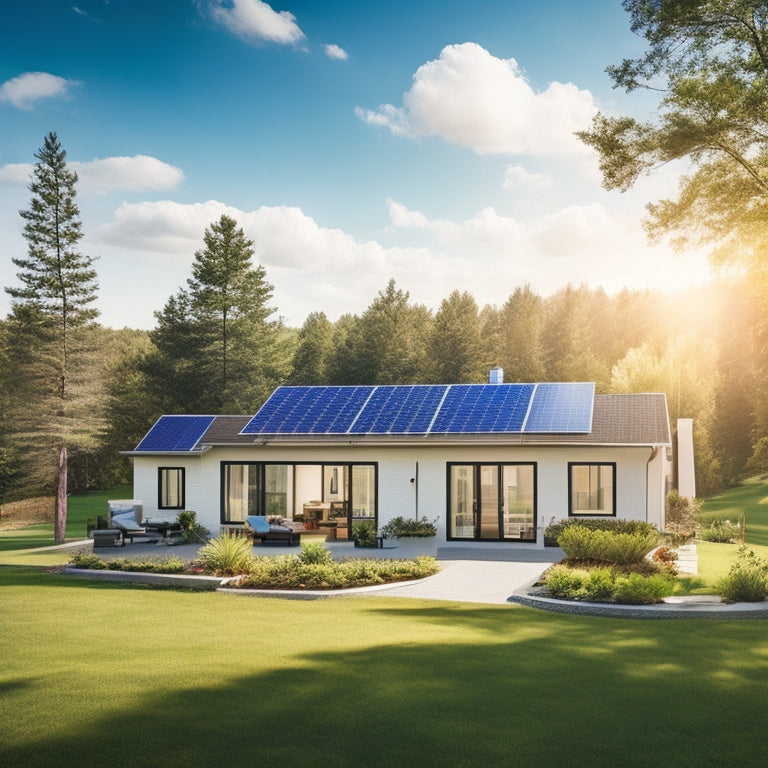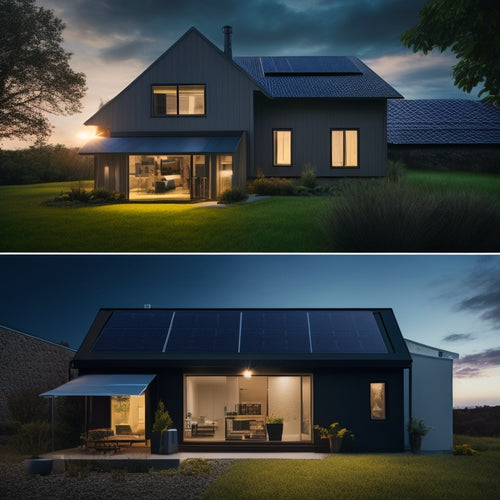
Selecting the Right Advanced Solar Inverter for Homes
Share
When selecting an advanced solar inverter for your home, you'll want to take into account your specific energy needs and assess your solar panel system's configuration. Calculate your daily energy consumption and factor in your appliances' power ratings and usage hours. Look for an inverter with a high efficiency rating, as it will maximize your energy yield. Also, guarantee the inverter is durable, reliable, and compatible with your solar panels. Opt for features like MPPT and smart charging to optimize energy production and battery life. As you explore these key factors, you'll uncover the perfect inverter to power your energy independence.
Key Takeaways
• Evaluate daily energy usage and available roof space to choose the right inverter size for your solar panel system.
• Consider inverter efficiency ratings like CEC to ensure maximum energy conversion and yield.
• Verify inverter compatibility with your solar panel system's DC source configuration and voltage range.
• Opt for inverters with low temperature coefficients, high MPPT efficiency, and flexible string configurations.
• Ensure the inverter has real-time monitoring and control capabilities for optimal performance and issue notification.
Understanding Off-Grid Solar Needs
When selecting an advanced solar inverter for off-grid homes, you must first determine your energy requirements, considering factors such as your daily energy usage, appliance types, and available roof or ground space for solar panels. This is vital, especially for remote communities seeking energy independence.
You'll want to calculate your total daily energy consumption in watt-hours (Wh) to make sure your inverter can handle the load. To do this, make a list of all your appliances, their power ratings, and the number of hours you use them daily. Add up the total energy consumption and multiply it by a factor of 1.5 to accommodate unexpected energy spikes.
Consider the type of appliances too - efficient LED lights, for instance, require less energy than traditional incandescent bulbs. Evaluating your energy needs accurately will help you choose an inverter that can reliably power your off-grid home. By doing so, you'll be well on your way to achieving energy independence, even in the most remote locations.
Key Features to Consider
When selecting an advanced solar inverter for your home, you'll want to focus on key features that guarantee peak performance and compatibility.
You'll need to think about the inverter's efficiency rating, which greatly impacts your system's overall energy yield.
Efficiency Ratings Matter
Your solar inverter's efficiency rating greatly influences your overall energy harvesting and savings, making it an essential aspect to keep in mind when choosing an advanced solar inverter for your home.
A higher efficiency rating means more of the sun's energy is converted into usable electricity, resulting in greater savings on your energy bills.
When evaluating efficiency ratings, consider the following key factors:
-
Peak Performance: Look for inverters with high peak efficiency ratings, typically above 98%, to guarantee maximum energy harvesting during ideal sunlight conditions.
-
Rating Systems: Be aware of the rating systems used, such as the California Energy Commission (CEC) rating or the International Electrotechnical Commission (IEC) rating, to accurately compare efficiencies across different inverters.
-
Temperature Coefficient: A lower temperature coefficient indicates better performance in high-temperature environments, ensuring consistent energy production.
- MPPT Efficiency: Opt for inverters with high MPPT (Maximum Power Point Tracking) efficiency to maximize energy output during partial shading or varying irradiance conditions.
Compatibility Is Key
Having optimized your solar inverter's efficiency, it's now essential to guarantee seamless integration with your home's electrical system by considering compatibility factors that can make or break your solar setup's performance.
As you evaluate advanced solar inverters, you'll want to make sure that the system integration is smooth and hassle-free. Look for inverters that comply with industry standards, such as UL 1741 and IEEE 1547, to secure safe and reliable operation.
When evaluating compatibility, consider the inverter's ability to communicate with your home's electrical system, including its grid connection and energy storage systems. A compatible inverter will smoothly integrate with your existing infrastructure, minimizing installation complexity and reducing the risk of system errors.
Additionally, look for inverters with built-in monitoring and control systems that can provide real-time data and remote monitoring capabilities. By prioritizing compatibility, you'll ensure a trouble-free and efficient solar setup that meets your energy needs.
Inverter Efficiency and Reliability
You expect your advanced solar inverter to convert DC power from your solar panels to AC power for your home efficiently and reliably, without compromising on performance or safety. After all, a high-quality inverter is essential for maximizing your solar energy output and minimizing downtime.
When evaluating inverter efficiency and reliability, consider the following key factors:
-
Inverter Durability: Look for inverters with a proven track record of withstanding harsh environmental conditions, such as extreme temperatures and humidity.
-
Failure Rates: Research the inverter's historical failure rates and compare them to industry benchmarks to make sure you're getting a reliable product.
-
Efficiency Ratings: Check the inverter's efficiency ratings, such as the California Energy Commission (CEC) rating, to ensure it can efficiently convert DC power to AC power.
- Certifications and Compliance: Verify that the inverter meets relevant safety and performance standards, such as UL and IEEE certifications.
Compatibility With Solar Panels
When choosing an advanced solar inverter for your home, you'll need to verify it's compatible with your solar panels.
You'll want to check the inverter's DC input requirements to confirm they align with your panel's voltage range.
Panel Voltage Ranges
The advanced solar inverter you choose must be compatible with your solar panel system's voltage range to guarantee efficient energy production and prevent damage to the inverter or panels. When selecting an inverter, you need to make sure it can handle the voltage output of your solar panels.
Here are some key considerations for panel voltage ranges:
-
Voltage Requirements: Check the inverter's voltage requirements to confirm they match your solar panel system's voltage output. Inverters typically have a specific voltage range, so it's important to verify compatibility.
-
Power Optimization: Opt for an inverter that can optimize power output across a range of voltages, ensuring maximum energy production even on cloudy or shaded days.
-
Maximum Power Point Tracking (MPPT): Look for an inverter with MPPT, which tracks the maximum power point of each string of panels to optimize energy production.
- String Configuration: Consider an inverter that allows for flexible string configuration, enabling you to customize your solar panel system's voltage output to match the inverter's requirements.
Inverter Compatibility Checks
Most advanced solar inverters have specific compatibility requirements that must be met to guarantee seamless integration with your solar panel system. As you select an inverter, you must confirm it's compatible with your solar panels to achieve peak performance. Incompatibility can result in reduced energy production, system downtime, or even complete system failure.
To guarantee compatibility, you should verify the inverter's specifications match your solar panel system's requirements. Here's a checklist to take into account:
| Compatibility Aspect | Inverter Requirements | Solar Panel Requirements |
| Grid Tie | 208/240V, 60Hz | 208/240V, 60Hz |
| System Integration | MPPT tracking, 10A max | 10A max, 150V-550V range |
| Electrical Harmony | 95% efficiency, THD < 5% | 95% efficiency, THD < 5% |
DC Input Requirements
You'll need to carefully evaluate your solar panel system's DC output to guarantee the advanced inverter you choose can accommodate its voltage and current ratings. This is important to make sure the inverter can handle the maximum power output of your solar panels.
When selecting an advanced solar inverter, consider the following DC input requirements:
-
Voltage Ranges: Make sure the inverter's input voltage range matches your solar panel system's voltage output.
-
Maximum Power: Verify the inverter's maximum power rating can handle the peak power output of your solar panels during periods of high irradiance.
-
Input Ramps: Check if the inverter's input ramp rate can accommodate the rapid changes in power output from your solar panels during morning and afternoon peak sun hours.
- DC Sources: Confirm the inverter is compatible with your solar panel system's DC source configuration, whether it's a single string or multiple strings.
Battery Charging and Management
When selecting an advanced solar inverter for your home, effective battery charging and management become vital considerations to guarantee seamless backup power supply during grid outages.
You'll want to make sure the inverter you choose can efficiently charge your batteries and manage their health to maximize their lifespan. A key aspect of this is cycle testing, which simulates real-world usage to verify the inverter's ability to handle repeated charge and discharge cycles. This testing helps you assess the inverter's performance and reliability.
Another essential feature to look for is smart charging. This technology optimizes charging based on factors like battery type, age, and temperature to prevent overcharging, which can reduce battery lifespan. Smart charging also enables you to set charging priorities, such as charging from the grid during off-peak hours or from solar power during the day.
Monitoring and Control Capabilities
By guaranteeing that your advanced solar inverter efficiently charges and manages your batteries, you can now focus on monitoring and controlling your system's performance through a robust monitoring and control capability. This feature enables you to track your system's performance in real-time, identify potential issues, and take corrective action to optimize energy production.
Some key aspects to consider when evaluating the monitoring and control capabilities of an advanced solar inverter include:
-
Real-time Data Analytics: Access to real-time data analytics allows you to monitor your system's performance and identify areas for improvement.
-
Remote Supervision: With remote supervision, you can monitor and control your system from anywhere, reducing the need for on-site visits and enabling faster issue resolution.
-
Customizable Alerts: Set up customizable alerts to notify you of any system anomalies or issues, ensuring prompt action can be taken to minimize downtime.
- Data Visualization: Clear and concise data visualization enables you to easily understand your system's performance and make data-driven decisions.
Sizing and Installation Considerations
Properly sizing your advanced solar inverter and ensuring correct installation are crucial to maximizing your system's energy production and longevity. When selecting an inverter, you need to take into account the roof orientation, as it affects the system's energy output. For example, a south-facing roof receives more sunlight than an east- or west-facing roof.
To guarantee a successful installation, you should also assess your home's electrical infrastructure. This includes evaluating the condition and capacity of your electrical panel and wiring. A thorough assessment will help you identify potential upgrades or replacements needed to support your solar system.
Here are some key considerations for sizing and installation:
| Consideration | Description |
|---|---|
| Roof orientation | South-facing roofs receive more sunlight |
| Electrical infrastructure | Evaluate panel and wiring capacity |
| Inverter size | Match inverter capacity to solar array size |
| Install location | Ensure easy access for maintenance |
| Grounding and bonding | Ensure safe and reliable operation |
Frequently Asked Questions
Can I Install an Advanced Solar Inverter Myself?
While you might be tempted to install an advanced solar inverter yourself, you should be aware of the DIY challenges and safety concerns involved, including electrical shock risks and improper system configuration.
Are Advanced Solar Inverters Compatible With All Solar Panel Brands?
Verifying compatibility before installation is crucial, as advanced solar inverters are generally compatible with most solar panel brands due to standardized connections. However, panel quality and brand variety can impact performance.
Can I Use an Advanced Solar Inverter With a Generator Backup?
You can use an advanced solar inverter with a generator backup to guarantee uninterrupted power supply, achieving grid independence and reliable backup power during outages or emergencies, while also optimizing your renewable energy harvesting.
Do Advanced Solar Inverters Require Regular Maintenance Checks?
You'll be relieved to know that advanced solar inverters are designed for reliability, but you'll still need to follow recommended maintenance schedules to guarantee peak performance and extend the inverter's lifespan.
Are Advanced Solar Inverters Compatible With Energy Storage Systems?
You'll find that advanced solar inverters are indeed compatible with energy storage systems, enabling Energy Optimization through System Integration, ensuring Battery Compatibility, and facilitating Inverter Synchronization for seamless Grid Services.
Related Posts
-

Top Portable Refrigerators for Camping Adventures
When you're camping, having a reliable portable refrigerator can make all the difference for keeping your food fresh ...
-

Smart Grid Technology Implementation Challenges
You'll encounter several challenges when implementing smart grid technology, particularly in cost management, scalabi...
-

Cost of Home Solar Battery
You're looking to invest in a home solar battery to reduce your grid reliance, but you're curious about the cost. The...


